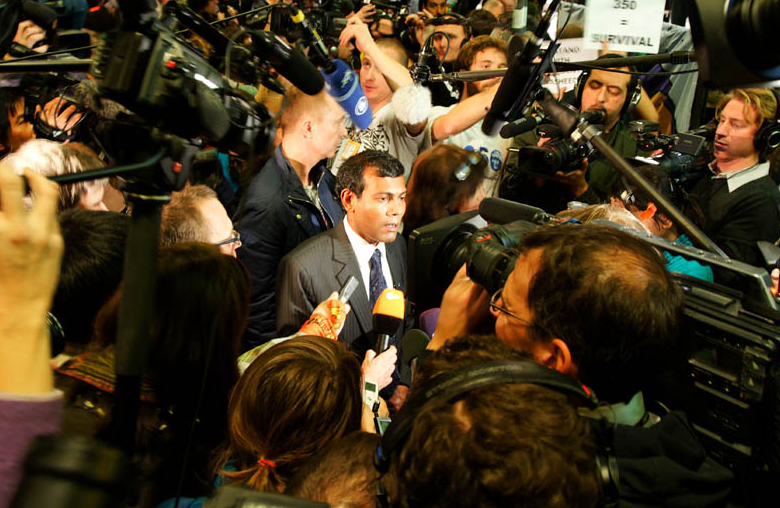The world’s 50-plus Small Island Developing States (SIDS), as the UN calls them, are on the front lines of climate change. Because of sea level rise, some will see large swaths of their land submerged, perhaps this century. Mohamed Nasheed, president of the Maldives, one of the world’s lowest-lying countries, recently warned on Twitter that “We are on the edge of extinction.” At the same time, most island nations are almost completely reliant on fossil fuels for energy. They are cooking their own geese.
What’s a low-lying nation to do?
Some useful answers may come on Nov. 4 at a live workshop in Glasgow, Scotland, during the UN’s COP26 climate conference. The workshop is aimed at developing a blueprint for deploying ocean thermal energy, which capitalizes on water temperature differences to produce electricity. It is being hosted by the US Coalition on Sustainability (USCS) with assistance from the Stimson Center’s Alliance for Climate Resilient Earth (ACRE), Pivot Projects, and the tech company SparkBeyond, which provides AI-assisted research capabilities. At the workshop, representatives of small island nations will discuss with scientists and energy experts the potential for them to become major producers of ocean thermal energy for their own use and for export. Participating organizations are expected to include representatives from SIDS, Lockheed Martin, Siemens, and the Global Ocean Resource and Energy Association.

This potentially-needle-moving interchange is being made possible in part by a new collaboration technology platform, SustainChain, which was developed to help unite businesses and other organizations committed to climate action. The technology platform, available online, including on mobile devices, provides an AI-based recommendation engine, search, and joint space for taking action. In little more than a year, more than 1000 organizations have joined.

SustainChain was developed by USCS in response to the urgings of UN Deputy Secretary-General Amina Mohammed to help accelerate progress in addressing climate change and meeting the UN’s Sustainable Development Goals (SDGs) for 2030. Jeffrey Sachs, an economics professor at Columbia University and thought leader in sustainable development, praised the platform at a Sept. 30 launch event for the latest version. “SustainChain provides a platform for rapid exchange of information, new connections, new business models, and new solutions, and that kind of networking of the solutions space can enable very rapid and alert movements and, frankly, first-mover advantages, for companies that understand this,” he said.
One of the goals of USCS was to bring together a diverse array of organizations that don’t usually encounter each other, including large corporations, climate activists, investors, research outfits, social enterprises, and technology-based startups. The aim is to prompt the private sector to move faster on climate change. The roster of corporate participants so far includes giant brands such as Danone, as well as plenty of small startups like Ananas-Anam, a London-based company that turns pineapple harvest waste into leather-like fabrics. “The private sector has to work in a systemic way,” says Jacqueline Corbelli, founder of USCS and SustainChain. “There was a need to bring some order, some visibility, and some automated capabilities to increase the velocity of how we take what we know and put it to work.”

Here’s how the platform works: via the smartphone app or website, people register and fill out a detailed profile—not just about themselves and their organizations but about their areas of expertise and interest. The form is the basis for an AI-based matching service that suggests other people and organizations they might want to work with. In addition, participants can create or join existing calls to action. Each of the projects is linked also to the relevant SDGs. “It’s a recommendation engine on top of a knowledge base. Everything is classified, mapped, and connected,” says Joanna Hall, executive director and head of product for USCS.
One of the first action tracks, which came together in late summer, was called Deploying Ocean Energy for Developing a Blue Economy. The goal of the group was to set up an ocean energy network to connect government planners, academics, engineers, and investors so they could share research and launch new initiatives. It quickly focused on harnessing thermal ocean energy for island nations, and the ocean workshop at COP26 grew out of that. One of the leaders of the initiative is Stan Bronson, director of partnerships for ACRE, which convenes research organizations and corporations to take on climate challenges. “No single organization or company or government can make a dent in climate change. But together we can create this giant partnership with super lift, and get critical mass so the things we do are scalable,” he says.
While the people behind SustainChain are busy adding participants and features, they are also launching a sister project, CitizenChain, during COP26 in Glasgow. CitizenChain is a civil society platform that will enable individuals and citizen groups to influence and support projects that are underway on SustainChain. It’s giving ordinary citizens a seat at the table to help decide what happens next.
—
Steve Hamm is a freelance writer and documentary filmmaker based in New Haven, Connecticut, USA. His new book, The Pivot: Addressing Global Problems Through Local Action, about the journey of Pivot Projects, was published in October by Columbia University Press. This is one of a series of dispatches from COP26.
Read more from Hamm’s COP26 Series:
October 29th: COP26: Let’s Pivot to Save the Planet
November 3: How Oil-Rich Aberdeen is Pivoting Away from Fossil Fuels
November 5: Glasgow Dispatch: Startup Funding Encourages Sustainability
















